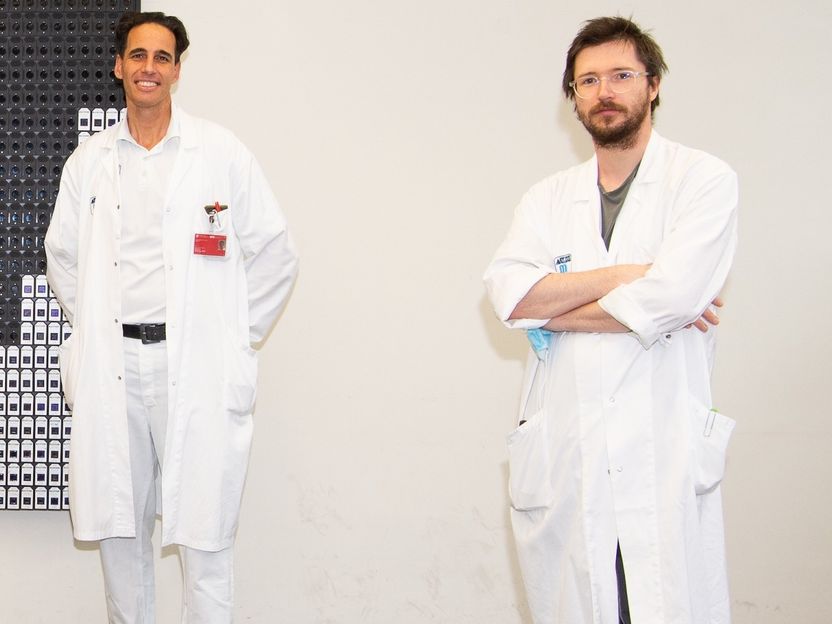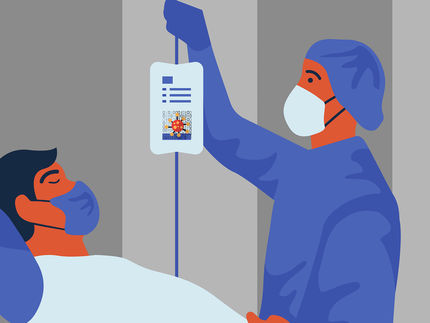The body’s defences against coronavirus
Researchers have investigated the connection between coronavirus infection and blood pressure and found encouraging results
Advertisement
An enzyme produced by the human body is the receptor for coronavirus, but its intravenous infusion could have a positive influence on the course of Covid-19 infections, thereby serving as a new treatment option. A research group led by the Viennese physicians Manfred Hecking and Roman Reindl-Schwaighofer has now presented evidence that the body reacts to severe cases of the disease by increasing the concentration of this enzyme. These findings have now been published in the American Journal of Respiratory and Critical Care Medicine and are important news for a recently completed clinical trial.

Austrian researchers around Manfred Hecking (left) and Roman Reindl-Schwaighofer have investigated the connection between coronavirus infection and blood pressure and found encouraging results.
Luiza Puiu/FWF
While there seems to be a connection between severe coronavirus infection and high blood pressure, most of the circumstances of this connection are still mysterious. It is known that the coronavirus uses a certain enzyme called ACE2 to dock on to cells to infect them. ACE2 is located on the membranes of body cells and helps regulate blood pressure. Previous experiments in mice suggested that ACE2 is down-regulated after coronavirus infection. Funded by the Austrian Science Fund FWF as part of its Urgent Funding SARS-CoV-2 track, a new study by investigators Roman Reindl-Schwaighofer and Manfred Hecking now challenges these assumptions.
An enzyme and its counter-regulator
ACE2 is part of the renin-angiotensin system, abbreviated as RAS, which controls the body’s fluid balance. “One of the many tasks of the RAS is maintaining blood pressure and blood volume, starting in the kidneys, via the liver and the lungs, through some central components and a number of effector molecules,” explains Manfred Hecking from the Medical University of Vienna, Austria. The best-known “player” in the RAS is angiotensin II, a protein that causes vascular contraction and thus increases blood pressure. It is primarily produced by the so-called angiotensin converting enzyme, ACE. The above-mentioned ACE2, the gateway into the cell for the coronavirus, acts as a counter-regulator to ACE. While ACE increases blood pressure during stress, ACE2 counteracts this stress. For this reason, the part of the RAS to which ACE2 belongs is also called ‘alternative’ or ‘good RAS’, explains Hecking: “Like many physiological systems the RAS thus consists of a classical player and an alternative antagonist.”
ACE2 as a drug
Given the role played by ACE2 in the infection process, researchers expected ACE2 to present changes in concentration during a coronavirus infection. In fact, data available at the beginning of the pandemic indicated that ACE2 might decrease during the course of the disease. “This decrease was shown in a mouse-model experiment by Josef Penninger’s group,” Hecking says. Their study used the SARS-Corona Virus (SARS-CoV-1), the predecessor of SARS-CoV-2, and most researchers assumed that the data would also be applicable to SARS-CoV-2 in the human system. The decrease in ACE2 was also thought to be responsible for tissue damage in cases of severe infection. Penninger’s team is now testing the administration of ACE2 as a method of treatment. “A big trial has recently been completed where ACE2 is being injected therapeutically, and there is a good chance that this approach can work.” According to Hecking, one of the ideas is to disable the virus, because it binds to the injected ACE2, rather than to the cell membranes, and thus infects fewer cells. Another factor the researchers rely on is the lung-protective effect of ACE2. The dramatic improvement of a severely affected patient in the course of a treatment trial with ACE2 has already been prominently published as a “case report”. More detailed studies on the effects of Corona on the RAS have so far been lacking.
Surprising result
A team led by Manfred Hecking and Roman Reindl-Schwaighofer has now investigated this connection in a large clinical study funded by the FWF. The study involved taking blood samples from 126 people with an acute Covid-19 infection and analysing them using mass spectrometry – a method that can detect the finest concentrations of chemical elements down to the level of individual atoms. The company of Marko Poglitsch, a bioanalysis specialist, acted as project partner in this investigation. Poglitsch previously created a kind of fingerprint of the patients’ RAS. “Many scientists have hypothesized that the RAS is dysregulated during a coronavirus infection, and it turned out that this dysregulation was indeed happening,” Hecking reports. The result was nonetheless surprising: “We were able to prove that ACE2 does not decrease in severe courses, but actually increases, to more than sevenfold.”
In order to better understand the mechanism behind this increase, a group of 27 people with severe influenza infection were examined in addition to the coronavirus patients. In that group, the researchers found an increase in the concentration of ACE2 similar to that found in the case of a coronavirus infection, although influenza viruses do not use ACE2 as a functional receptor. Hecking speculates that this effect could be directly linked to the lung damage. “The fact that ACE2 rises after a SARS infection does not have to be connected to the virus. The concentration could also increase because the lungs are inflamed.” This assessment is shared by other research groups, including that of Roman Ullrich, who heads a group on lung research at the University Clinic for Anaesthesia, General Intensive Care Medicine and Pain Therapy in Vienna. “The lungs could try to protect themselves by strengthening the alternative (‘good’) RAS,” Hecking suggests.
Drug perhaps nonetheless effective
Additional results could soon be shedding more light on this issue. “Roman Reindl-Schwaighofer is analysing the local situation in the lung tissue,” Hecking reports and notes that it will be exciting to learn the outcome. “It is particularly important to analyse the tissue locally, not just the angiotensins in the blood,” he emphasises.
The clinical study, which is currently still ongoing, is part of a research project by Manfred Hecking called “Covid-19 and RAS Blockade”, studying the molecular and clinical effect of RAS-modifying drugs, which was the first project to be approved by the Austrian Science Fund FWF in a “fast track” procedure in May 2020, owing to its relevance in the corona pandemic. Some of the participants in the study are part of the largest clinical trial on coronavirus in Austria, ACOVACT, which is investigating the clinical efficacy of therapeutic agents against coronavirus disease.
Hecking stresses that his data do not contradict the administration of ACE2 as a drug. On the other hand, the body itself is apparently capable of producing more ACE2 in more severe courses of Covid-19. “Early administration of high doses of ACE2 may be useful, potentially because it takes time for the body to increase its own level of ACE2 and the enzyme is not initially present in clinically relevant doses.”



















































